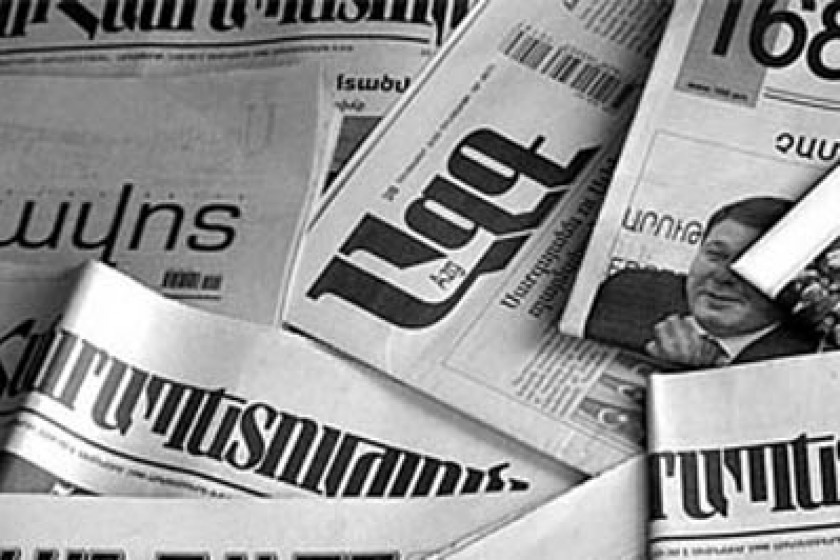
Armenia's Print Media: Diverse But Superficial and Mostly Focused on Intrigue
The print media in Armenia, in contrast to other media, is extremely politicized.
Newspapers, more of less reflect the political landscape in the country. Rather than informing, the print media is more interested in trumpeting, extolling these various political forces.
Being so selective regarding their coverage, individual papers fall short of covering the entire political spectrum. Rather than providing information, we thus are faced with veiled or subliminal campaigning and propaganda.
This has set forth a certain culture between readers and the newspaper. Thus, readers don’t buy a newspaper from the newsstand to get the most possible objective coverage of the issues, but rather they want to read news and information than supports the convictions they already adhere to. For the most part, newspaper readers are citizens with preset political positions.
In the pre-campaign period, we can single out a number of characteristics. One spectrum of the media, is furtively carrying out campaigning for the ruling authorities; i.e. the Republican Party of Armenia (RPA). In this regard, the papers Hayots Ashkharh and Iravunk come to mind. This political alignment is conditioned by the fact that Constitutional Rights Union President Hayk Babukhanyan has been included on the proportional ballot of the RPA. Both papers are more active in counter-campaigning; vocally criticizing almost all the initiatives of the competitors.
Some newspapers carry out the same function for the opposition Armenian National Congress (HAK). Here we can point to Haykakan Zhamanak, Chorrord Inkniskhanutyun, and, in part, Zhamanak.
In fact, the papers supporting either side more resemble propaganda broadsheets than anything else.
In a separate category are the newspapers that call themselves independent. They closely resemble one another when it comes to their objectives and writing style. Here, we’re talking about Hraparak, Zhoghovurd and Hayatsk, newspapers that have become laboratories of non-sourced information.
These papers have no discernible political stance, and their main objective seems to be stirring up the pot of political intrigue. Thus, they enjoy a certain following, which in turn makes them of interest to all political players in the elections. As to what counterbalance these papers will bring to the electoral mix remains to be seen. However, it is clear that their main targets are the candidates running for single mandate seats.
Another category of independent papers is comprised of those who are not only trying to play within the confines of measures objectivity but underlined political correctness as well – Hayastani Hanrapetutyun, Azg, Aravot and 168 Zham.
The first two are currently mainly covering the procedural aspect of the elections; clearly avoiding propagandizing. The scope of the others is much wider, incorporating internal and inter-party relations and processes taking place regarding the electorate and the candidates.
In contrast to the others, however, they adopt a much deeper approach. It’s noteworthy that representatives from both (in the first a reporter; in the second an editor) were nominated for the elections and have thus ceased their press functions. The papers Yerkir and Orakarg are also trying to maintain the principle of correctness, even though they both have political preferences and campaign priorities. The first openly backs the ARF and the second backs the Prosperous Armenia Party, but much more subtly.
The inclination of the political forces participating in the election race to use the print media as information bait is clear.
This “handwriting” of the papers also stems from the fact that the parties practically lack any official news coverage of their own. Reporters try to supplement the gap by putting pressure on their own personal sources. This is the reason that individual interviews and conversations with politicos, and the generalities and commentary based on them have become so widespread. But it is not the mass media or voters that suffer as a result, but the parties themselves who cannot guarantee supervised flows of information.
Sometimes, all this does not allow for priorities to be differentiated from what is secondary. Sometimes, themes of crucial election interest are not covered by the newspapers.
In particular, there was no serious professional analysis of the election slogans put forth by the parties. When it came to the ballots of the parties, the first twenty names of which could be regarded as shadow and possible future government lists, the press failed to scrutinize and evaluate them in terms of personnel potential.
The ideological potential of the political forces was completely overlooked as well as the realm of programmatic approaches.
There was practically not one press analysis regarding the degree to which the parties now in the parliament have fulfilled their campaign pledges of the past. This would have been a helpful resource for voters when it came to a comparison of who actually accomplished what, or failed to.
In this regard, today’s press appears to be intent on covering the May elections on a fairly superficial and matter of fact basis, as if to say – why bother covering them in depth and detail anyway – they won’t change things.
 Videos
Videos Photos
Photos




Comments (4)
Write a comment